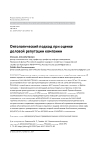An ontological approach to assessing a company’s business reputation
DOI: 10.33917/mic-4.117.2024.72-82
Asset management of a company as a set of its property rights is an important process of economic life. Asset analysis and valuation is important for making management decisions. The valuation of the company’s assets is complicated by the fact that the assets are considered as part of a functioning complex or as an independent type. Since a fair assessment increases the reliability of the conclusions and the significance of the appraiser firm, the formalization of its conclusions should be based on ontology terms used for internal coding of user knowledge.
The evaluation of intellectual property objects is conditioned by the requirements of the market in the relations of economic entities. Since a fair assessment increases the reliability of conclusions based on ontology terms used for internal coding of user knowledge, the article focuses on the results of intellectual activity, which differs in legal content and a number of features of reflecting intangible assets in accounting. Based on the practice of creating ontologies, it is impossible to assert that there is a single universal approach that would contribute to an absolutely successful result, but for appraisers this method seems to be the most optimal.
References:
1. Gorshkov S. An introduction to ontological modeling. LLC TriniData, 2016.
2. Resolution of the Plenum of the Supreme Court of the Russian Federation dated 02/24/2005 No. 3 «On judicial practice in cases of protection of honor and dignity of citizens, as well as business reputation of citizens and legal entities». WG. No. 50, 03/15/2005; Bulletin of the Supreme Court of the Russian Federation, 2005. No. 4.
3. Opalsky A.P., Amelina N.A. Formation of the image of a computer game developer company and protection of reputational risks. Microeconomics. 2023;2:48–56.
4. Gafurova L.S. Business reputation as a factor of sustainable development of the enterprise. The international scientific journal «Symbol of Science». 2021;4:59–60.
5. Tirole J. A Theory of Collective Reputations (with Applications to the Persistence of Corruption and to Firm Quality. The Review of Economic Studies. 1986;63(1):1–22.
6. The Law of Ukraine «On Banks and Banking activities» dated 07.12.2000 No. 2121-III (with amendments and additions). URL: https://juristoff.com/bankovskoe-delo-kreditovanie/190-o-bankakh-i-bankovskoj-deyatelnosti ?ysclid=lvatbs5mcq230196725
7. Resolution of the Plenum of the Supreme Court of the Republic of Belarus «On the practice of consideration by courts of civil cases on the protection of honor, dignity and business reputation» dated December 23, 1999 No. 15. URL: https://court.gov.by/ru/jurisprudence/post_plen/civil/moral/ae30ed7f3a7d445c.html
8. Erdelevsky A.M. Compensation for moral damage: analysis and commentary of legislation and judicial practice. 3rd ed. M., 2004.
9. Order of the Ministry of Finance of the Russian Federation dated May 30, 2022 No. 86n «On approval of the Federal Accounting Standard FSB 14/2022 “Intangible Assets”». URL: https://www.consultant.ru/document/cons_doc_LAW_420322 /?ysclid=lvaxdlm8ct674140159



